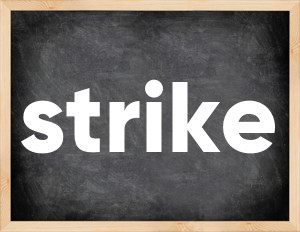 The English verb 'strike' is pronounced as [straɪk].
The English verb 'strike' is pronounced as [straɪk].
Related to:
irregular verbs.
3 forms of verb strike: Infinitive (strike), Past Simple - (struck), Past Participle - (struck).
Here are the past tense forms of the verb strike
👉 Forms of verb strike in future and past simple and past participle.
❓ What is the past tense of strike.
Strike: Past, Present, and Participle Forms
| Base Form | Past Simple | Past Participle |
|---|---|---|
| strike [straɪk] |
struck [strʌk] |
struck [strʌk] |
What are the 2nd and 3rd forms of the verb strike?
🎓 What are the past simple, future simple, present perfect, past perfect, and future perfect forms of the base form (infinitive) 'strike'?
Learn the three forms of the English verb 'strike'
- the first form (V1) is 'strike' used in present simple and future simple tenses.
- the second form (V2) is 'struck' used in past simple tense.
- the third form (V3) is 'struck' used in present perfect and past perfect tenses.
What are the past tense and past participle of strike?
The past tense and past participle of strike are: strike in past simple is struck, and past participle is struck.
What is the past tense of strike?
The past tense of the verb "strike" is "struck", and the past participle is "struck".
Verb Tenses
Past simple — strike in past simple struck
(V2).
Future simple — strike in future simple is strike (will + V1).
Present Perfect — strike in present perfect tense is
struck
(have/has + V3).
Past Perfect — strike in past perfect tense is
struck
(had + V3).
strike regular or irregular verb?
👉 Is 'strike' a regular or irregular verb? The verb 'strike' is irregular verb.
Examples of Verb strike in Sentences
- I must strike right now before Paul is fully prepared (Present Simple)
- He says Mr Green struck him (Present Simple)
- We had struck on the foundations of atomic model (Past Perfect)
- The clock in the church tower struck ten (Past Simple)
- If military strikes it will have worse consequences (Present Simple)
- Never know when inspiration will strike (Present Simple)
- We can move freely, strike at will (Present Simple)
- One day, perhaps soon, they will strike back (Future Simple)
- You never know where love will strike, he once told me (Present Simple)
- We believe he will strike again (Present Simple)